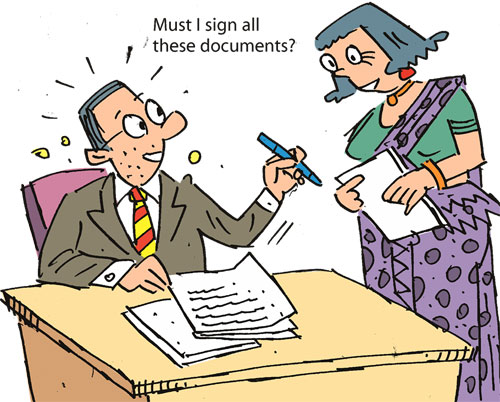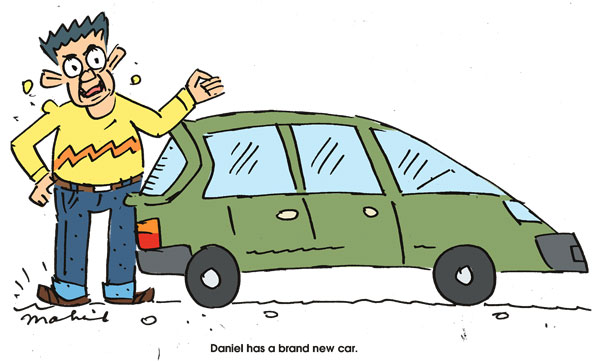|

by R. S. Karunaratne
Howto express certainty
We use ?must? to express certainty.
You must be tired. (= I am certain that you are tired.)
He is a well-known businessman. He must be having a lot of money.
The house is open. They must be in.
Laura speaks impeccable French. She must be French.
Anne has a lot of books. She must be reading a lot.

Nowadays a lot of people are studying political science. It must be
interesting.
Look at those shoes. He must be having very big feet!
Oh, you live in Kundasale. You must know Maureen Young.
The negative of ?must? is ?can?t.?
Your version of the accident can?t be true. (= I am certain that it
is not true.)
Semini always wears old clothes. She can?t have much money.
The door is closed. The lawyer can?t be in office.
Listen to his queer accent. He can?t be Australian.
John has an expensive wristwatch. He can?t be a clerk.
Brian is a hot-tempered man. He can?t have many friends.
Colvin had dinner a little while ago. He can?t be hungry.
There aren?t many people at the cinema. The film can?t be interesting.
?Must? has other uses. It is used to show that something is necessary
or important.
Meat must be cooked thoroughly.
I?m tired and I must get some sleep.
You mustn?t be rude to anybody.
Small children mustn?t be left unattended at public places.
Must I sign all these documents?
We use ?must? to express a definite intention.
It?s getting dark. I must leave now.
I feel insecure here. I must phone the police.
You mustn?t bite nails.
We use ?must? for emphasis.
I must say, you look gorgeous!
I must admit, I didn?t want to hurt your feelings.
You must come here and spend a few days with us.
We must meet some time.
In informal English, we use ?must? as a noun.
If you?re going abroad, a passport is a must.
?Cannot? is contracted as ?can?t.? ?Cannot? is always written as a
single word.

Some people can?t do without a mobile phone.
[Activity]
Fill in the blanks with ?must?, ?mustn?t or ?can?t?. Check your
answers with the key.
1. We ............ ridicule the poor.
2. You ........... be faithful to your friends.
3. Sharon is only 16. She .......... apply for a job.
4. Children ............ look after their parents when they are old.
5. We ............ waste money during the festival season.
6. She ........... go abroad as she doesn?t have a passport.
7. Teachers ............... encourage students to attend private tuition
classes.
8. Buddhists .............. observe the Five Precepts.
9. If you have no money, you ........... be happy.
10.Some people have all the comforts. They ........... be happy.
Key:
1.mustn?t 2. must 3. can?t 4. must 5. mustn?t 6. can?t 7. mustn?t 8.
must 9. can?t 10. must
Starters:
The difference between ?have? and ?have got?
As a general rule, ?have? and ?have got? mean the same. Although we
can use either form, ?have got? is more informal than ?have.? We also do
not use ?have got? in short answers.
[Have]
Father has three houses.
Vindhya has a toothache.
Daniel has a brand new car.
We have a good school library.
They have a lot of money.

[Have got]
Father has got three houses.
Vindhya has got a toothache.
Daniel has got a brand new car.
We have got a good school library.
They have got a lot of money.
[Negative]
Rani doesn't have a job.
Or: Rani hasn't got a job.
They don't have money to buy an apartment.
Or: They haven't got money to buy an apartment.
Do I have to wait in the queue?
Or: Have I got to wait in the queue?
Does she have to go abroad for higher studies?
Or: Has she got to go abroad for higher studies?
Note: We do not often use ?had got? in the past tense.
We had several assignments to complete.
We didn't have time to finish all the assignments.
Why did you have to wait so long?
We use ?have? as an action verb.
We have lunch around 12.30 p.m.
Some people have a shower every morning.
The children had a wonderful holiday.
They have cricket practice in the evening.
Do you like to have a game of cards?
Note: When we use ?have? as an action verb, we cannot use the ?have got?
form.
We use ?have? as an action verb in the progressive tenses.
Lorna is having table tennis practice.
We are having a conversation in English.
What time are you having your English class?
In negative and question forms, we use ?do? with ?have.?
Why didn't you have a haircut?
Where do you have your French class?
We don't have tuition classes on Poya days.
How often do they have theory classes?
We use ?have? with a noun in certain expressions.
Let's have a swim in the swimming pool.
I usually have a nap in the afternoon.
I had a talk with the principal.
They are having an argument.
Can I have a cool drink?
We are having visitors next week.
They are having a wonderful time in Nigeria.
Match words and meanings
Here?s a novel way to enrich your vocabulary. Match the words in
Column A with their meanings in Column B. Check your answers with the
key. The first one has been done for you.
[Column A]
... 1. bilateral
... 2. bile
... 3. bilingual
... 4. billet
... 5. billow
... 6. billy goat
... 7. bimbo
... 8. bimonthly
... 9. bin
... 10. binary
... 11. bind
... 12. biochemical
... 13. biodata
... 14. biodegradable
... 15. biofuel
... 16. biographer
... 17. biorhythm
... 18. bipartisan
... 19. biped
... 20. bisect
... 21. bitch
... 22. bivouac
... 23. biweekly
... 24. bizarre
... 25. blabber
[Column B]
A. a place for soldiers to stay in
B. a fuel made from living things
C. one who writes somebody?s life-story
D. a regular pattern of physical processes in an organism
E. appearing every two months or twice a month
F. consisting of two parts
G. details about somebody?s life
H. able to decay naturally
I. involving two groups or countries
J. able to use two languages
K. a male goat
L. connected with the chemistry of living things
M. a container for waste
N. a bitter yellow liquid produced by the liver
O. to divide something into two parts
P. a temporary shelter for sleeping
Q. very strange and unusual
R. appearing every two weeks or twice a week
S. a female dog
T. an animal that walks on two legs
U. supported by or consisting of two political parties
V. to talk a lot
W. to tie lightly
X. a young attractive woman who is not intelligent
Y. to spread over a large area
Key:
2.N 3. J 4. A 5. Y 6. K 7. X 8. E 9. M 10. F 11. W 12. L 13. G 14. H
15. B 16. C 17. D 18. U 19. T 20. O 21. S 22. P 23. R 24. Q 25. V |

